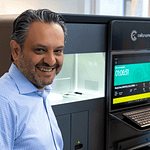What if you could step inside a molecule? On today’s episode of Mendelspod, we talk with Steve McCloskey, founder and CEO of Nanome, the company bringing virtual reality into the world of drug discovery and molecular modeling. A former nanoengineering student at UC San Diego and a self-described futurist, Steve founded Nanome to create what he calls the "ultimate scientific interface"—a way for scientists not just to visualize molecules, but to interact with them naturally in 3D space.
0:00 The ultimate science app
2:15 A use case
7:15 How does VR interaction change things?
12:47 Intuition at the nanoscale
23:10 Can VR redefine biological models and become the norm?
35:15 Hard to give career advice now with rapid rise of tech
Nanome’s VR platform enables researchers to grab, rotate, and manipulate proteins, explore molecular dynamics, and even collaborate remotely inside a shared molecular environment. Built with both scientific rigor and the playful spirit of a 3D gamer, Nanome is already being used from classrooms to major pharmaceutical firms.
One of the most compelling ideas discussed today is the possibility that VR can help biologists build intuition at the nanoscale, much like space exploration and science fiction helped earlier generations develop intuition about the cosmos. "Ninety-nine percent of people have no intuition for the nanoscale," McCloskey says. "You look at molecules on a 2D screen, and it's like a ball of spaghetti. But in VR, you pretty much instantaneously get it."
This new kind of "nano-intuition" could, McCloskey argues, open doors for faster discovery, better communication, and broader scientific literacy. As he puts it, "Space is fascinating because it's so vast and mysterious. But the nanoscale is even denser with phenomena—and we’re just beginning to explore it."
Looking ahead, Steve sees VR as becoming a normal part of the scientific workflow. Though today's headsets are still bulky, future versions could be as light as eyeglasses, embedding a whole new layer of spatial computing into everyday research.
As Steve says: "If we can give scientists—and even the general public—intuition for the nanoscale, it might radically change how we approach biology, drug development, and science education itself."












